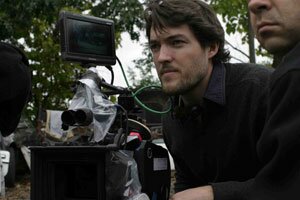Projecting the future: Carmike cinemas go digital
While Kevin Martin was watching Shooter at the Carmike Cinema 6 two weekends ago, something seemed amiss to the former Jefferson Theater projectionist.
"I couldn't hear the shutter of the projector," he says, "and sure enough, I turned around, and it's a digital projector."
Since March 16, fans who've seen movies at the Carmike haven't been watching an actual 35mm film. All six screens now use a Christie DLP Cinema Projector, part of a nationwide rollout, and by October, the theater chain will have converted all 2,300 of its screens to digital, making Carmike the first national chain to make the switch.
"The image that comes from a DLP is bar none the best resolution out there," says Christie spokesperson Dorina Belu. "I'm sure you've seen films with pops on the screen, or the film will break and tear and cancel the screening altogether. With this, it's a pristine image every time."
Though Martin admits imperfections he sees with digital are "not noticeable unless you're looking for them," pristine is not the word he'd use to describe the picture quality. "The reds get really red and the whites, especially sunlight, get really blown out. And in low-light scenes, you can see little bars where there's not enough contrast."
However, Martin concedes that the digital switch is to the benefit of the moviegoing public. "For years, they've had such horrible projection at the Carmike, so the average moviegoer will see an improvement," he says.
Carmike spokesperson Dale Hurst says his company had been intrigued with digital projection for some time, but finally got on the digital bandwagon when Hollywood got on the bandwagon.
"The technology's been around for a few years, but like high-definition television, if there's no HDTV signal, there's no HDTV," he says. "Now I daresay that 80 to 90 percent of the product coming out of Hollywood can be shown digitally."
Initially, major Hollywood studios were reluctant to go digital, not for aesthetic reasons, but because of concerns about how the movies would get to the theaters. Each projector doubles as a computer that downloads a movie via satellite from a central server in Cypress, California, and the studios had concerns that hackers could interrupt that process and pluck whole movies from cyberspace.
Now, Belu says, Christie and their IT partners, AccessIT, have so finely tuned the process that it's "nearly impossible" to steal a movie.
"Every step of the chain has its own security methodology that requires the movie to be unencrypted and then encrypted again," she says. "We haven't had any reports of piracy so far."
While Hollywood has now gone full steam for digital projection, local filmmaker Derek Sieg says the real windfall belongs to low-budget, independent filmmakers like himself.
"This levels the playing field," he says. "You can start with one digital copy of your movie, and by tomorrow you can have 10,000, whereas with film, that's going to cost you tens of thousands of dollars."
Sieg adds that had digital projection been as common two years ago when he was shooting his feature debut, Swedish Auto, in Charlottesville, he would have had the movie finished in less time.
"We scanned all the film into computers, tweaked the image and put it back onto film," he says. "Now we can skip that step, because the film print was only a delivery device of the image we already created on the computer."
Don't write celluloid's obituary just yet, though. Only 10 percent of the screens in North America will be digital by the time Carmike completes its rollout, and some prominent filmmakers like Martin Scorsese refuse to exhibit their films digitally. For this reason, Hurst says Carmike will continue to maintain some 35mm projectors, at least one for every Carmike facility. Still, he's convinced that once the paying public can see the difference between celluloid and digital, the market will speak for itself.
"My father owned a theater, and I've worked in movie theaters since 1961," he says, "and the difference between 35mm [film] and digital doesn't compare. This is the next best thing to being there."

Homegrown filmmaker and Swedish Auto director Derek Sieg says the relatively low cost of duplicating his movies for digital projection "levels the playing field" for independent films.
FILE PHOTO BY JAKE MALONEY
#